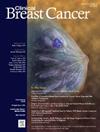乳腺癌女性患者的精神诊断及其治疗:对 1062 名住院患者的潜类分析
IF 2.9
3区 医学
Q2 ONCOLOGY
引用次数: 0
摘要
肿瘤心理支持(POS)和精神药物干预可有效治疗乳腺癌患者的精神症状。然而,尽管乳腺癌患者的精神障碍患病率很高,但仍有很大一部分患者未得到治疗。我们对 2012 年至 2019 年期间在综合癌症中心接受诊断和治疗的 1062 名乳腺癌患者的数据进行了回顾性分析。我们对患有精神疾病的患者人数、POS 和精神疾病药物进行了描述性评估。我们使用潜类分析来研究 ICD-10 编码的精神科诊断、POS、精神科药物以及作为重要预后因素的肿瘤分期和躯体合并症之间的关系。31.5%的患者有精神科诊断,20%的患者接受了 POS 治疗,60%的患者接受了精神科药物治疗。潜类分析显示了三个亚组:1)癌症分期低、躯体合并症低、无精神诊断、无 POS 和无精神药物治疗的患者;2)癌症分期低、躯体合并症低、有精神诊断、POS 和精神药物治疗的概率高于 1 类和 3 类的患者;3)癌症分期晚、躯体合并症高、有精神诊断和 POS 的概率高于 1 类、无精神药物治疗的患者。这项研究表明,乳腺癌患者中精神障碍的发病率很高,而患有精神障碍的患者人数与接受精神药物治疗的患者人数之间存在差异。确定亚组可能有助于为那些需求未得到充分满足的患者提供更有针对性的治疗。本文章由计算机程序翻译,如有差异,请以英文原文为准。
Psychiatric Diagnoses and Their Treatment in Women With Breast Cancer: A Latent Class Analysis of 1062 Inpatients
Introduction
Psycho-oncological support (POS) and psychopharmacological interventions are effective in treating psychiatric symptoms in patients with breast cancer. However, despite high prevalences of psychiatric disorders in patients with breast cancer, a significant proportion remains untreated.
Methods
Data from 1062 breast cancer patients who had been diagnosed and treated at a Comprehensive Cancer Center between 2012 and 2019 were analyzed retrospectively. We descriptively evaluated the number of patients with a psychiatric diagnosis, POS and psychiatric medication. Latent class analysis was used to examine the relationship between ICD-10 coded psychiatric diagnoses, POS, psychiatric medication, and, as important prognostic factors, tumor stage and somatic comorbidity.
Results
31.5% of all patients had a psychiatric diagnosis, 20% received POS and up to 60% received psychiatric medication. Latent class analysis revealed three subgroups: 1) patients with a low cancer stage, low somatic comorbidity, no psychiatric diagnosis, no POS and no psychiatric medication; 2) patients with a low cancer stage, low somatic comorbidity, a psychiatric diagnosis, and a higher probability of POS and psychiatric medication than class 1 and class 3; 3) patients with advanced cancer stage, high somatic comorbidity, a higher probability of a psychiatric diagnosis and POS than class 1, and no psychiatric medication.
Conclusion
This study indicated a high prevalence of psychiatric disorders among patients with breast cancer and a discrepancy between the number of patients having a psychiatric disorder and those receiving psychiatric medication. The identification of subgroups might contribute to better tailored treatment for those patients whose needs are insufficiently met.
求助全文
通过发布文献求助,成功后即可免费获取论文全文。
去求助
来源期刊

Clinical breast cancer
医学-肿瘤学
CiteScore
5.40
自引率
3.20%
发文量
174
审稿时长
48 days
期刊介绍:
Clinical Breast Cancer is a peer-reviewed bimonthly journal that publishes original articles describing various aspects of clinical and translational research of breast cancer. Clinical Breast Cancer is devoted to articles on detection, diagnosis, prevention, and treatment of breast cancer. The main emphasis is on recent scientific developments in all areas related to breast cancer. Specific areas of interest include clinical research reports from various therapeutic modalities, cancer genetics, drug sensitivity and resistance, novel imaging, tumor genomics, biomarkers, and chemoprevention strategies.
 求助内容:
求助内容: 应助结果提醒方式:
应助结果提醒方式:


